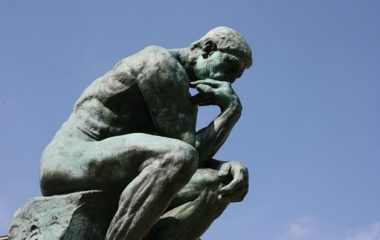Mental Illness Is A Vicious Circle
Mental IllnessI’m a lumper.
I think addiction, anxiety, homelessness and mental illness all run together.
The different mental illnesses are all alike in that they are all diseases of isolation. They want to kill you but they want to get you alone first. Schizophrenia, Bipolar disease, Drug abuse, alcoholism, depression and anxiety; thought disorders, mood disorders, memory disorders, all impair both our ability to take care of ourselves and our connections with other people. They all have different ways of doing it and different time lines but they all want to get you alone so they can have their way with you. And they are often causally linked. People don’t become drug addicts or alcoholics out of the blue; they are almost always treating underlying anxiety, social isolation and or other issues. Mental illness leads to more mental illness.
We can argue percentages but it’s undeniable that the root causes of much mental illness as well as physical illness are things that happen in childhood. A parent in prison, actively alcoholic or mentally ill parents, crushing poverty, neglect, abuse all have long term health consequences.
The good news is that recovery from illness can and does work the same way in the opposite direction; health leads to health. Successful treatment leads to more successful treatment within families and neighborhoods and regions and so forth/on.
How people recover from different behavioral health conditions is more similar than dissimilar. Therapeutic communities, psychiatric hospitals, CBT, peer counseling, 12 step groups, acupuncture, psychotherapy, art therapy, mood stabilizers, yoga, antipsychotic medications, etc. all work by helping people connect with other people. Those connections are both a reason and a way to get well. Recovery is a process whereby positive things are positive because they lead to other positive things. The core is wanting to be better and learning how to recognize what better looks and feels like. Magic bullets are rare.
Over the years I’ve noticed that there are people, maybe everyone to a degree, who find my mental illness at least a little comforting because it reassures them that they are not mentally ill. My meeting diagnostic criteria means that they do not. Further it means that they won’t end up in a nut house, straight jacket and forced to take medications and be at risk to loose their families and careers and maybe do terrible stuff they won’t get over. They won’t be stigmatized.
The word stigma means an outward and visible sign of an inner state. Stigmatizing the mentally ill is a form of bullying. Like all forms of bullying it hurts everyone. Like alcoholism and other addictions, it doesn’t come from nowhere. No one wants to be bullied or mentally ill. Even so-called normals who applaud and support recovery find at least some comfort and reassurance in their own wellness. The subtext of my having a diagnosis is that you don’t. My having a thought disorder and/or mood disorder somehow means that your thoughts and moods are well-ordered. Patients are no different. Chronics look at acutes and think the acutes are sicker than they are. Acutes might be crazy but they’re not crazy all the time.
Step one in getting rid of bullying and stigma is to realize that we’re part of the problem and that the problem is fear. The most important thing we can do to combat stigma is to believe, live and practice the notion/fact that people get better. Yes, some people relapse, but then they can and do get better again; sort of like asthma or ear infections. In spite of illness there is health.
It’s also helpful to lump stigma, provider burn out, bullying, lack of acute care beds, the high cost of pharmaceuticals, suboptimal outcomes and a few other things. Fill in the blank. Treatment works. When a patient gets better, we all get better. It doesn’t matter where we make a start as much as that we do make a start and that we know it’s a we thing. Treating mental illness is not Lone Ranger type work.
“If nothing I say resonates, it’s possible you’re taking too much medication. If it’s the greatest talk you’ve ever heard, it’s possible you should be taking a little more.”
Many, many people recover from periods of dysfunction second to thoughts and/or moods that are not compatible with taking care of yourself. The fact that most of them can and do clean up, get rid of the outward signs of mental illness and pass for normal, gives credence to the idea that there is a sharp divide between the mentally well and the mentally ill. There isn’t.
There is a hierarchy. Schizophrenia is worse than Bipolar disease.
“When did you get an accurate diagnosis?”
“Hard to say. Do you an idea about when you’ll get yours?”
People like the idea of accurate diagnosis because it goes along with the idea of accurate treatments that can cure or better treat the mentally ill. I have zero argument with the idea that my symptoms and history are much more consistent with bipolar disease than schizophrenia that’s mostly because I’ve gotten well. It’s also worth noting that I take both antipsychotic drugs approved by the FDA for treating schizophrenia and mood stabilizers and that they both work.
People find the idea that I take psychiatric medication unsettling because there aren’t outwards signs, stigmata, that I take medication, which actually means that the doses are about right. People, even the mentally ill or maybe especially the mentally ill want there to be sharp lines. Chronics make fun of acutes. When they get better the acutes return the favor. People who don’t take medication want it to mean something good about them. They’re not as sick or stronger or more in tune with Mother Nature or God.
The point is to have a good life. Medications have serious side effects. You’d be crazy to take them if you didn’t need them but equally crazy to not take them if you do need them.
Many signs and symptoms of Bipolar disease have upsides. I honestly don’t know how people without loose associations and flights of ideas get much done.
The Lust for Life bullshit stigmatizes both mental illness and creativity and is part of what makes it so hard to get welI. If van Gogh had lithium he would have painted more and lived longer.
Back to Blog


